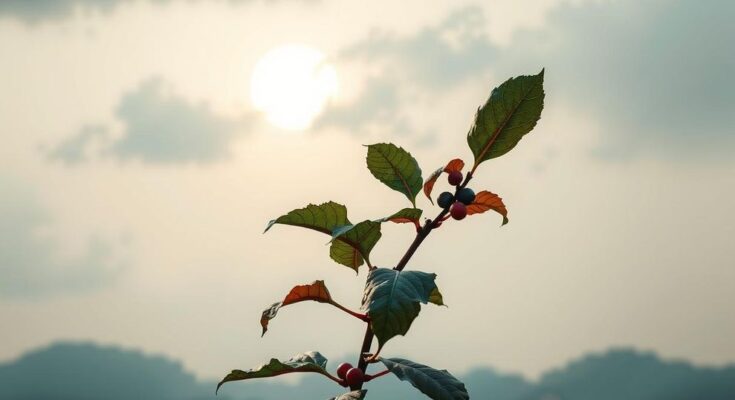Brazil’s coffee industry faces significant impacts from climate change, with production declining slightly in 2024 due to adverse weather conditions such as droughts and extreme temperatures. Expocacer is implementing innovative practices like smart irrigation and regenerative agriculture to counteract these challenges. Notably, their Educampo Project provides farmers with essential support for improved management and sustainability.
Climate change poses significant challenges for Brazil’s coffee industry, with 2024 production estimated at 54.79 million 60kg bags, a slight decrease of 0.5% from the previous year. This decline stems from adverse weather conditions, including droughts and extreme temperatures, which have severely affected coffee crops in various regions, notably the Cerrado Mineiro. Farmers encountered prolonged droughts and frosts, leading to catastrophic losses in productivity.
Fernando Couto, an agricultural engineer with SEBRAE/Educampo, highlights that these climatic conditions resulted in a water deficit exceeding 400mm in certain areas. This deficit caused irreversible damage, such as the burning of productive branches and physiological disorders that diminished the plants’ yields. In response to these challenges, Expocacer is actively pursuing innovative and sustainable approaches to maintain coffee farming viability.
To combat these difficulties, Expocacer and its producers are investing in advanced technological solutions and integrated management practices. Key initiatives include smart irrigation systems featuring soil moisture sensors and weather stations, which enhance water efficiency. Additionally, irrigated crops have shown the potential to yield 11 more bags per hectare annually compared to non-irrigated counterparts.
The cooperative also promotes regenerative agricultural practices involving organic fertilizers and soil management techniques to support root development and enhance plant resilience. Programs aimed at greenhouse gas reduction, such as those matching the Brazilian GHG Protocol, have earned Expocacer recognition, making it the first Brazilian coffee cooperative to achieve this milestone.
Expocacer plays a pivotal role in providing technical support and training through initiatives like the Educampo Project, devised alongside Sebrae Minas. This program connects producers with specialized consultants for property management assistance, facilitating crop monitoring and the development of tailored production plans.
Désio Rodrigo, a farmer from Lidon Cachoeira Alta, attests to the advantages of the Educampo Project, noting improvements in sustainable management that enable the tackling of environmental challenges. He states, “The program helped us identify cost-saving opportunities, reduce pesticide use.” The technical support has been crucial in modernizing operations and optimizing production processes.
In summary, climate change presents serious hurdles for the coffee sector in Brazil, with the Expocacer cooperative leading the way in addressing these challenges through innovative practices and sustainable solutions. Their efforts, including effective irrigation and regenerative methods, demonstrate the potential for resilience in coffee production despite adverse weather conditions. Collaborations like the Educampo Project further empower producers to adapt and thrive in an evolving climate landscape.
Original Source: www.teaandcoffee.net




